 Petzlover
Petzlover Giant Maso Mastiff is originated from Germany but St. Bernard is originated from Switzerland. Both Giant Maso Mastiff and St. Bernard are having almost same height. Both Giant Maso Mastiff and St. Bernard are of same weight. Both Giant Maso Mastiff and St. Bernard has almost same life span. Giant Maso Mastiff may have more litter size than St. Bernard. Giant Maso Mastiff requires Low Maintenance. But St. Bernard requires High Maintenance
Giant Maso Mastiff is originated from Germany but St. Bernard is originated from Switzerland. Both Giant Maso Mastiff and St. Bernard are having almost same height. Both Giant Maso Mastiff and St. Bernard are of same weight. Both Giant Maso Mastiff and St. Bernard has almost same life span. Giant Maso Mastiff may have more litter size than St. Bernard. Giant Maso Mastiff requires Low Maintenance. But St. Bernard requires High Maintenance
 The Giant Maso Mastiff is a fairly new dog breed so you aren’t going to find much history on him.
The Giant Maso Mastiff is a fairly new dog breed so you aren’t going to find much history on him.
The breed was only started in 2001 so as to create a mastiff dog that would have fewer health problems and therefore have the chance to live longer. The Giant Maso came about because of a mix between the Old English Mastiff and the Cane Corso Italiano.
As stated, breeding began in 2001 and the dog has inherited intelligence and protective instincts from both these dogs.
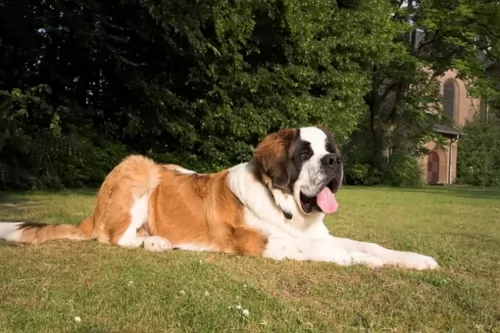 The St Bernard breed was once called the Alpine Cattle Dogs or the Alpine Mountain Dogs. They have always been farm dogs and mountain dogs in the French and Swiss Alps. They come from the border land of Switzerland and France. They were herding dogs, hunting, search and rescue, watchdogs and draft dogs.
The St Bernard breed was once called the Alpine Cattle Dogs or the Alpine Mountain Dogs. They have always been farm dogs and mountain dogs in the French and Swiss Alps. They come from the border land of Switzerland and France. They were herding dogs, hunting, search and rescue, watchdogs and draft dogs.
Their ancestors are considered to include the Sennenhunds and molosser breeds that came to the Alps with the ancient Romans. There are four Sennenhund breeds that are believed to have contributed to the original St. Bernard. These included the Greater Swiss Mountain Dog (Grosser Schweizer Sennenhund), the Appenzeller (Appenzeller Sennenhund), the Bernese Mountain Dog (Berner Sennenhund) and the Entlebucher Mountain Dog (Entlebucher Sennenhund) Today the St. Bernard is considered a Molossoid breed.
The first we know of the St. Bernard in any written records was in 1707 at the Great St. Bernard Pass and Great St. Bernard Hospice run by monks. There were found paintings of the dogs dating back into the late 1600’s. It is told that Barry saved upward of 100 people in the St. Bernard pass, and it is from these stories that the dogs gained their snow rescue reputation.
The St. Bernard of that time did not look like the St. Bernard does today as there was much crossbreeding. Many dogs dies during rescues in the avalanches of the mid 1800’s and so they Saint was crossed with the Newfoundland to preserve the breed. You can today see the resemblance in the build and looks of the two breeds. This cross brought about the long haired St. Bernard whose fur was too heavy for rescues.
The St. Bernards of mountain rescue fame were only about the size of a German Shepherd dog and were short haired. After crossing with the Newfoundland and moving into clubs and dogs shows, they have been bred to be much larger. Before the stud book was closed, it is thought that many larger breeds such as the Greater Swiss Mountain Dog, the English Mastiff, the Tibetan Mastiff, the Rottweiler, the Great Pyrenees, the English Bulldog, the Great Dane, the Bernese Mountain Dog, the Boxer and the Caucasian Oycharka all contributed to today’s St. Bernard.
In 1884 The Swiss St. Bernard Club was founded and the breed entered the Swiss Stud book as its first entry in 1884. It was 1888 when the standard was approved and the breed became the national dog of Switzerland. Before the name St. Bernard came to be common, these dogs might be called, Barry Dogs, Alepnmastiff, Noble Steeds or Saint Dogs.
The dogs came to England in the early 1800s and to the United States soon after. They were recognized by the European kennel clubs first and by the early 1900’s they were the most popular breed in the AKC.
 The Giant Maso Mastiff is a large dog breed and can stand at between 67 to 70cm in height and weigh 60 to 90-kg.
The Giant Maso Mastiff is a large dog breed and can stand at between 67 to 70cm in height and weigh 60 to 90-kg.
He has a big square head with medium sized floppy ears and thick neck covered with loose skin. Muscular, he is a deep chested dog with powerful legs and long tail. The fur of the dog is short and sleek and can be a number of colors such as fawn, an apricot color, gray and black as well as brindle.
Intelligent, protective, self-confident, balanced and calm, the Giant Maso Mastiff may be quite an imposing looking dog but he is gentle-natured towards his family.
The large dog loves to please and receive praise from his human family. He is the perfect friend, getting on well with children in the home as well as with other dogs. Training and socialization is easy for this dog and it is important that he is trained if you want him to be an obedient pet.
He is gentle, intelligent, protective – simply known as a gentle giant, being calm, steady and amicable. This breed loves to please and needs lots of companionship from his human family, loving just to lie close by to them.
He isn’t a particularly active dog, but will still need to join you on a walk every day. It is why the Maso Mastiff can live in the city or in the countryside, because not being an overly active dog, he doesn’t need a large garden.
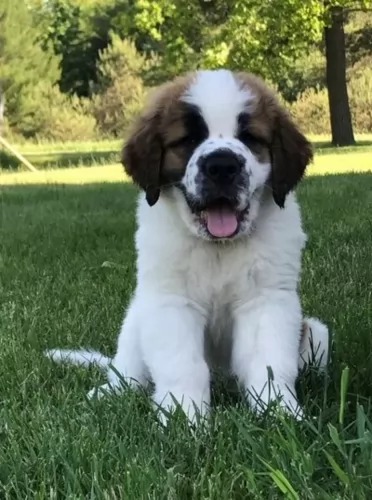 Today’s St. Bernard is not a large dog, he is a giant dog. Weighing in at 140-200 pounds and standing 28 to 35 inches tall, he is a lot of dog. Bred with mastiffs and large mountain dogs, they have proportional and powerful build. They are strong, sturdy and well muscled. They have either a smooth or rough (short or long) coat. Their eyes are brown or occasionally blue. They have tight lids, and square heads and muzzles.
Today’s St. Bernard is not a large dog, he is a giant dog. Weighing in at 140-200 pounds and standing 28 to 35 inches tall, he is a lot of dog. Bred with mastiffs and large mountain dogs, they have proportional and powerful build. They are strong, sturdy and well muscled. They have either a smooth or rough (short or long) coat. Their eyes are brown or occasionally blue. They have tight lids, and square heads and muzzles.
There are two coat types called smooth and rough, or short and long. The smooth shorter coat is tough, flat and close against the body and the long, rough coat is dense, wavy and heavy around the legs, neck and ruff. Both types have long tails that hang low and are heavy. Saints are known to slobber, drool and snore.
 Your Giant Maso Mastiff is such a gentle giant of a dog. He is well behaved and gentle so that it almost seems unnecessary to have him trained and socialized and yet doing so will make him even more amicable.
Your Giant Maso Mastiff is such a gentle giant of a dog. He is well behaved and gentle so that it almost seems unnecessary to have him trained and socialized and yet doing so will make him even more amicable.
Calm and gentle he makes the perfect pet for families where there are children as well as elderly people. He is quite frankly everyone’s friend, being a loving family pet. If you’re a family more into indoor games and TV watching than an outdoor, sporty kind of family, the Giant Maso Mastiff will suit you.
He will love to settle down and watch TV with you. He isn’t particularly active, although he will certainly need a walk every day.
Those who have owned a Giant Maso Mastiff will tell you that this is an excellent family pet, making a wonderful companion dog.
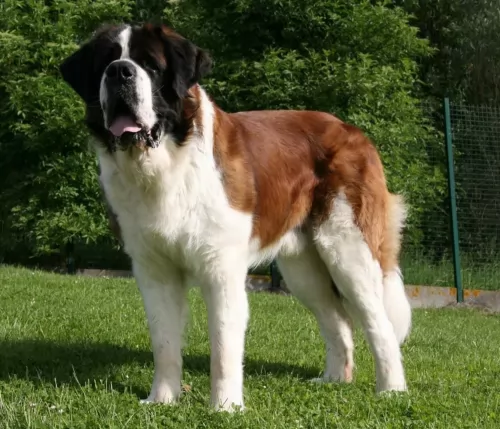 3.Adaptability no - these are giant dogs that need a lot of room. A large fenced yard or farm is best. They won’t do well in an apartment. They need exercise every day and loping around a yard is very good for them. They love to play in the snow, carry a backpack or pull a cart. They love to have a “job”
3.Adaptability no - these are giant dogs that need a lot of room. A large fenced yard or farm is best. They won’t do well in an apartment. They need exercise every day and loping around a yard is very good for them. They love to play in the snow, carry a backpack or pull a cart. They love to have a “job”
4.Learning ability – They are smart and highly trainable if motivated. They may appear lazy but they are just laid back and need a motivation.
 There has always been the concern with joint disorders in large breed dogs. Both hip- and elbow dysplasia can occur with your Giant Maso Mastiff, more so if you overfeed him as a puppy and he grows too fast.
There has always been the concern with joint disorders in large breed dogs. Both hip- and elbow dysplasia can occur with your Giant Maso Mastiff, more so if you overfeed him as a puppy and he grows too fast.
With hip dysplasia, the long bone of the leg forms incorrectly. This can lead to pain and lameness with your pet.
Also check out bloat. This is a serious illness when the stomach fills with air and can twist. Gastric Dilatation-Volvolvus, is an emergency situation then which is found more often in large, deep-chested dog breeds.
If you see your dog with a bloated stomach and acting in a strange, lethargic way, get him to the vet immediately as bloat can be life threatening.
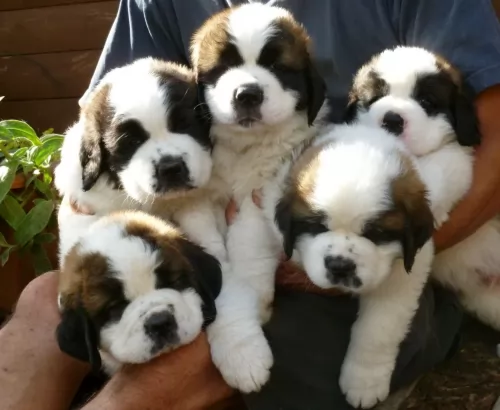 The first problem this breed faces is how fast they grow and gain weight. This can lead to serious health issues if not controlled. Their bones can be damaged by this excessively fast rate of growth. Other issues facing the breed include:
The first problem this breed faces is how fast they grow and gain weight. This can lead to serious health issues if not controlled. Their bones can be damaged by this excessively fast rate of growth. Other issues facing the breed include:
 As an average shedder, the smooth, shorthaired coat is easy to groom, and a good brush twice a week will be adequate.
As an average shedder, the smooth, shorthaired coat is easy to groom, and a good brush twice a week will be adequate.
The Giant Maso Mastiff has floppy ears and therefore these should be checked for ear infections. Wax build up and dirt will need to be checked and cleaned.
His nails will need to be clipped, especially if they don’t wear down on their own and his teeth will need to be cleaned 2 or 3x a week to avoid dental disease.
With a large dog breed puppy such as the Giant Maso Mastiff, rapid growth is a risk factor for developing joint and bone conditions. The growth period can last till 12 months and puppies of large breeds should actually have their caloric intake adjusted during this growth period.
It is important to ensure that your puppy grows at a slow, steady rate. If you are feeding dog food from the commercially manufactured range, if you aren’t sure, speak to your vet about large breed dog foods. You want to be sure that this gentle giant of yours receives the best dog food there is, whether commercial branded dog food or your own home-made food. Good nutrition is imperative for the health of your pet.
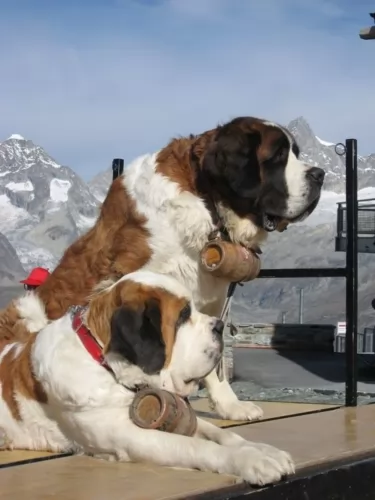 1.Feeding the puppy – You want to control their growth. Do not overfeed, and make sure they exercise but not too much. Feed a high quality large breed puppy food 3-4 X a day in small amounts.
1.Feeding the puppy – You want to control their growth. Do not overfeed, and make sure they exercise but not too much. Feed a high quality large breed puppy food 3-4 X a day in small amounts.
2.Feeding the adult – The problem you face with he adult St. Bernard is the potential for Bloat. Don’t over feed. Don’t feed before or after strenuous exercise. Feed 2-3 X a day in smaller amounts to prevent Bloat. Feed a high quality breed specific food if possible or an extra large breed formula.
4. Games and Exercises They need exercise but not as much as you might think. The St. Bernard is a laid back lumbering character so don’t over exercise her. They enjoy weight and cart pulling but they are not athletes who enjoy frisbee or agility. Search and rescue trials and tracking trials are perfect athletic endeavors for them.